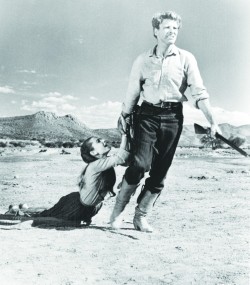Cinema | January 21st, 2015

Fifty-five years ago, just as the Civil Rights Movement was growing in America, two films by major directors came out that addressed racial intolerance with a surprising explicitness for the time, outside of obvious social issue dramas.
Premiering in April and December 1960, respectively, these were disguised as colorful western action genre pictures with advertising campaigns that made little or no reference to their basic plot point: one of them promoting what looked like a sprawling pioneer adventure and the second sometimes implying that it was mostly just another Elvis Presley musical.
Both stories dealt with the prejudice against Native Americans rampant a century before (and still-timely), yet seem obviously designed as metaphors equally applicable to contemporary black/white racial tensions then in the news. Both films involve interracial romance, both exploit the widescreen formats of Panavision and CinemaScope, and both got Blu-ray releases during the last half of 2014.
In “The Unforgiven” director John Huston gets in a lot of great material that is very effectively handled, but for whatever reason there is really too much in the finished film for its own good. Trimming about 15 to 20 minutes might have put this film among Huston’s best work, but as it stands it remains good rather than great (yet is often underrated, even by Huston himself). It lingers too long on a number of sequences, including a horse-breaking scene that seems to foreshadow elements of Huston’s next film “The Misfits.” Still, Huston is closer to fine form after a couple of lesser films two years earlier -- the problematic “The Roots of Heaven” and the interesting misfire “The Barbarian and the Geisha.”
Perhaps star and co-producer Burt Lancaster wanted to showcase as much as possible the big-name cast, which includes Audrey Hepburn, Audie Murphy, John Saxon, Charles Bickford, Lillian Gish and a young Doug McClure. Also, the production company was looking for a marketable product rather than a potentially inflammatory racial statement. It doesn’t completely eliminate the entire reason for the story’s conflict, yet extends scenes that merely add a bit of color to the characters.
The plot lays bare complex conflicts involving personal feelings, family ties, social pressures and racial bigotry. Characters on both sides are depicted ambivalently, with admirable and reprehensible traits. They’re often paradoxical human individuals, rather than broad one-dimensional stereotypes. Oversensitive viewers may thus interpret the film itself as being racist, rather than depicting the evils of racism, especially since it seems focused on ranch family relationships, romantic subplots, sibling squabbles and more.
Picture quality on Kino’s Blu-ray is quite sharp overall, with some occasional film wear that is rarely distracting. Audio quality is decent if not especially rich or wide-frequency. The only bonus feature is a trailer that looks like it’s upscaled from standard-definition.
THE UNFORGIVEN on Blu-ray – Movie: B+ / Video: A- / Audio: A- / Extras: D
Singing sensation Elvis Presley might have become a respected dramatic actor if he’d been allowed to play more serious roles as he does in “Flaming Star,” in a part said to have been intended for Marlon Brando. Presley stars as Pacer, the half-breed son of a rancher (John McIntire) and his Kiowa Indian second wife (Dolores del Rio). Pacer and his parents live in peace with his white half-brother from a previous marriage (Steve Forrest), the neighboring white settlers (including Barbara Eden) and area Indian tribes, until a new young chief decides he’s fed up with broken treaties decimating his people and starts a new range war against the settlers.
This naturally creates a disturbing conflict within Pacer, whose loyalty is torn between his white friends and relatives and his Kiowa relatives. The film depicts the racial bigotry on both sides as neighbors turn on them for being friendly with the Indians, and when Pacer’s mother tries to make peace the Kiowa tribe rejects her as a traitor for marrying a white man.
Director Don Siegel (better-known for later films with Clint Eastwood including “Dirty Harry”) handles the action and the character conflicts effectively, as well as the racial tension that drives the plot. After a deceptively relaxing opening scene setting up main characters and giving Elvis his only chance to sing, just a few minutes into the movie violent action erupts that quickly puts Presley’s character and his family literally in the middle of the controversy.
The situation builds into complicated developments, action sequences and several unexpected dramatic twists, especially for a film from 1960 and more especially from an “Elvis film.” All of it revolves around the latent prejudice that rapidly reveals itself when violence and tragedy happen. The film’s strong similarities to John Huston’s “The Unforgiven” extend to its sometimes sketchy depiction of certain aspects of character backstory, but overall it ties things together more efficiently and in a good half-hour shorter screen time.
Twilight Time’s Blu-ray has a fine HD transfer that sometimes shows its age but is sharp and clear with good color. The 5.1 DTS-HD audio preserves the film’s original stereo sound, a relatively rare extravagance for the time. Bonus features include an illustrated pamphlet, an audio commentary, an isolated music score and the original trailer (in standard-definition).
FLAMING STAR on Blu-ray – Movie: A- / Video: A / Audio: A / Extras: B-
March 2nd 2026
February 23rd 2026
February 23rd 2026
February 16th 2026
February 16th 2026
_(1)_(1)_(1)_(1)_(1)__293px-wide.jpg)


__293px-wide.png)

